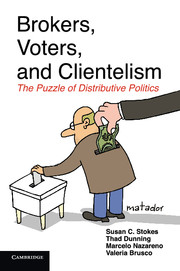Book contents
- Frontmatter
- Dedication
- Contents
- List of Tables
- List of Figures
- Preface and Acknowledgments
- I MODALITIES OF DISTRIBUTIVE POLITICS
- II THE MICRO-LOGIC OF CLIENTELISM
- III THE MACRO-LOGIC OF VOTE BUYING: WHAT EXPLAINS THE RISE AND DECLINE OF POLITICAL MACHINES?
- IV CLIENTELISM AND DEMOCRATIC THEORY
- Appendix A: Argentina Brokers' Survey
- Appendix B: Argentina Voters' Surveys
- Appendix C: Venezuela Voters' Survey and the Maisanta Database
- Appendix D: India Voters' Survey
- References
- Index
- Miscellaneous Endmatter
Appendix D: India Voters' Survey
Published online by Cambridge University Press: 05 June 2014
- Frontmatter
- Dedication
- Contents
- List of Tables
- List of Figures
- Preface and Acknowledgments
- I MODALITIES OF DISTRIBUTIVE POLITICS
- II THE MICRO-LOGIC OF CLIENTELISM
- III THE MACRO-LOGIC OF VOTE BUYING: WHAT EXPLAINS THE RISE AND DECLINE OF POLITICAL MACHINES?
- IV CLIENTELISM AND DEMOCRATIC THEORY
- Appendix A: Argentina Brokers' Survey
- Appendix B: Argentina Voters' Surveys
- Appendix C: Venezuela Voters' Survey and the Maisanta Database
- Appendix D: India Voters' Survey
- References
- Index
- Miscellaneous Endmatter
Summary
Our voters' survey in the Indian states of Karnataka, Bihar, and Rajasthan took place in the context of a study of the effect of caste-based quotas in local village councils (see Dunning 2010, Dunning and Nilekani 2012). To select our study group of councils (called gram panchayats), we first purposively sampled six districts in Karnataka, which vary in terms of strength of different parties and locally dominant castes. We took advantage of the procedure by which quotas rotate across councils in different electoral terms to construct a regression-discontinuity (RD) design, in which the assignment to caste-based quotas was either truly randomized or as good a randomly assigned (see Dunning 2009). Using this RD design, we constructed a study group of 200 village council constituencies, 100 of which had their presidencies reserved for Scheduled Caste or Scheduled Tribe presidents in 2007 and 100 of which were unreserved or reserved for Backward Classes. Although council constituencies were selected according to the RD design, rather than by a probability sampling scheme, and although the six included districts were purposively sampled, means on a variety of covariates are quite similar in our selected councils and in a statewide dataset, suggesting that our sample may be quite representative of the state of Karnataka. Indeed, as the final column of Table Appendix D.1 shows, the data are consistent with a simple random sample from the underlying population of village councils.
- Type
- Chapter
- Information
- Brokers, Voters, and ClientelismThe Puzzle of Distributive Politics, pp. 297 - 298Publisher: Cambridge University PressPrint publication year: 2013



